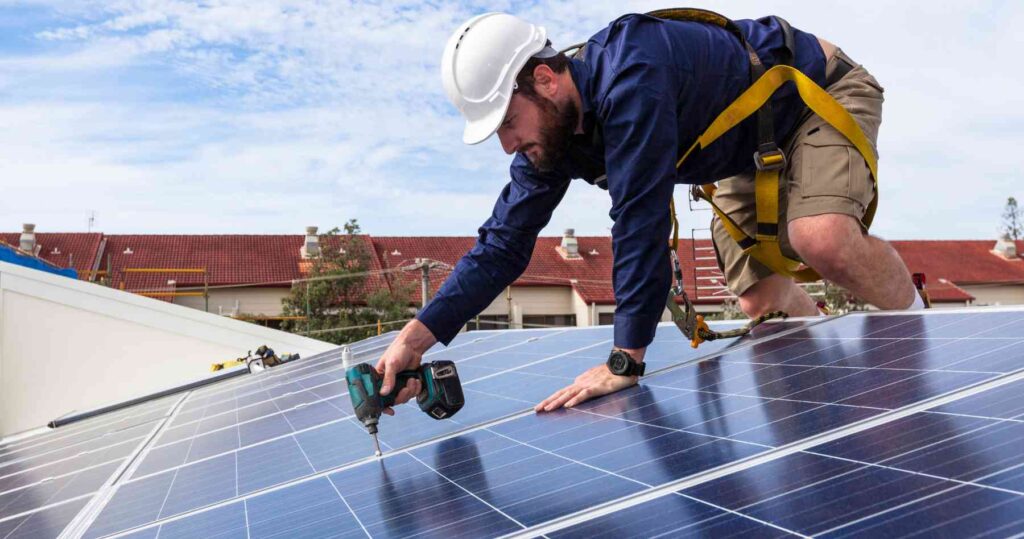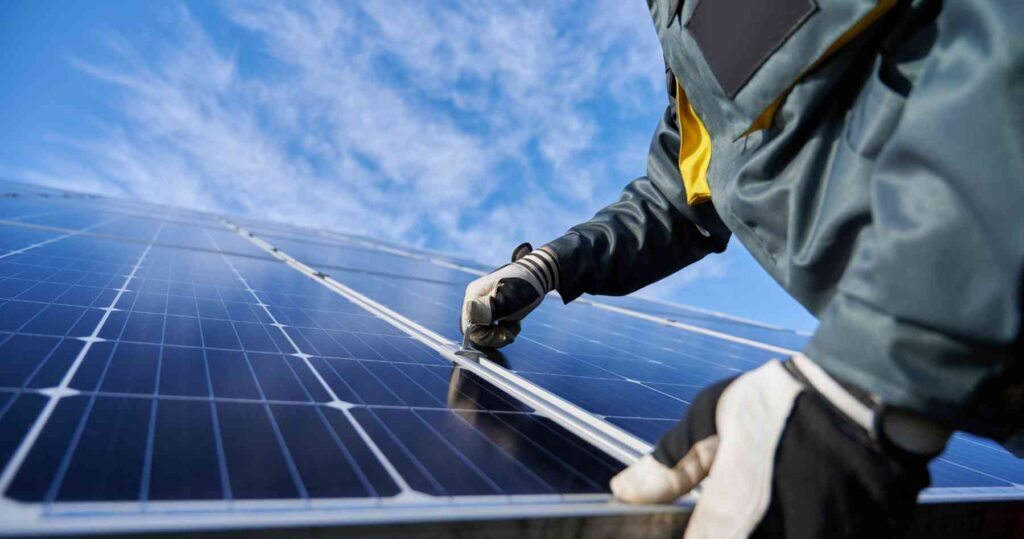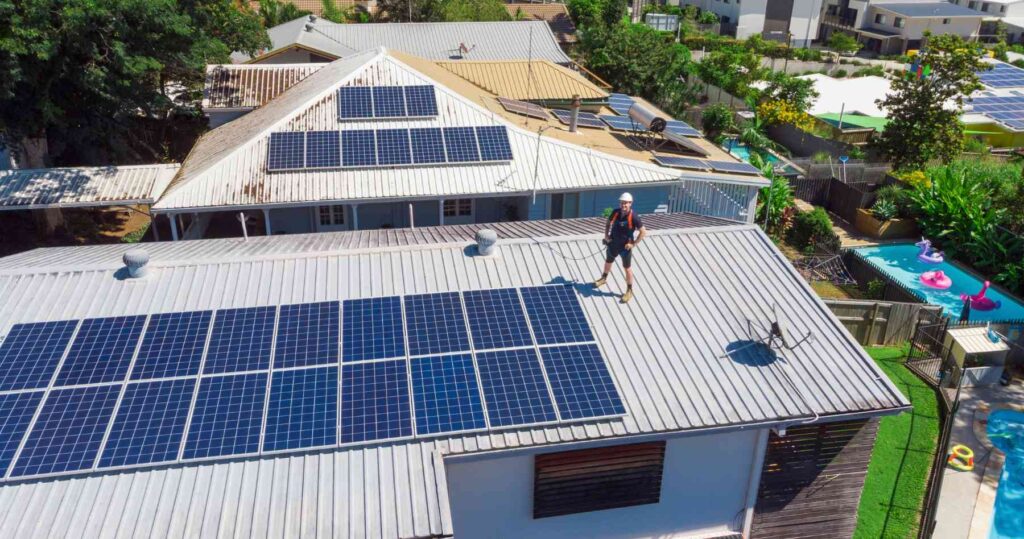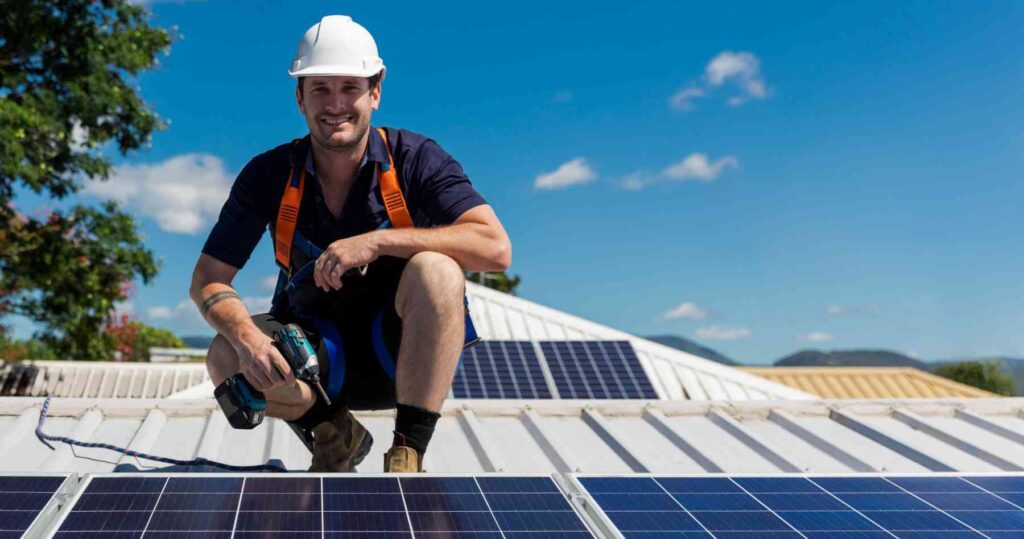The Ultimate Guide to Solar Panel Installation
Harnessing the Power of the Sun for a Sustainable Future
Harnessing the power of the sun is a key strategy for achieving a sustainable future. Solar energy, derived from the sun’s rays, offers numerous benefits that make it an attractive and viable alternative to traditional energy sources. Firstly, solar power is a clean and renewable energy source, meaning it produces no harmful emissions or pollutants that contribute to climate change. This makes it an environmentally friendly option that helps combat global warming.
Additionally, solar energy is abundant and widely available, with the sun providing an inexhaustible supply of energy. As technology advances, solar panels have become more efficient and affordable, making it increasingly accessible to individuals, businesses, and communities. Moreover, solar power systems can be installed on rooftops, in open fields, or even integrated into building materials, making it a versatile solution for both urban and rural areas. By harnessing the power of the sun, we can reduce our dependence on fossil fuels, mitigate climate change, and create a more sustainable future for generations to come.

Solar Panel Installation
Understanding the Basics of Solar Energy
Solar energy has emerged as a game-changer in the pursuit of clean, renewable power. At its core, solar energy harnesses sunlight and converts it into electricity through the use of solar panels. This guide will walk you through the process of solar panel installation, helping you make informed decisions for a greener tomorrow.
Benefits of Solar Panel Installation
Solar panel installation offers an array of benefits that extend beyond reducing your carbon footprint. By harnessing the sun’s energy, you can significantly lower your electricity bills, increase your property’s value, and contribute to a cleaner environment. With solar power, you’re not just saving money – you’re investing in a sustainable future.
How Solar Panels Work
Solar panels, also known as photovoltaic (PV) panels, operate by utilizing photovoltaic cells to convert sunlight into direct current (DC) electricity. An inverter then transforms this DC power into alternating current (AC), which is the type of electricity used in homes and businesses. This simple yet effective process is the foundation of solar panel technology.
Assessing Your Solar Potential
Determining Sunlight Availability on Your Property
Before embarking on a solar panel installation journey, it’s crucial to evaluate the amount of sunlight your property receives. A solar site assessment can help determine whether your location is suitable for optimal energy production. Factors such as shading, orientation, and tilt angles play a pivotal role in maximizing your solar potential.
Evaluating Energy Consumption Patterns
Understanding your energy consumption patterns is essential for sizing your solar panel system appropriately. Analyzing your past electricity bills and usage trends will enable you to tailor your installation to meet your specific energy needs, potentially leading to substantial savings.
Calculating Potential Energy Savings
A significant incentive for solar panel installation is the potential for long-term energy savings. By estimating your system’s energy production and factoring in local electricity rates, you can project your future savings and determine the payback period of your investment.
Types of Solar Panels
Monocrystalline vs. Polycrystalline Panels
When choosing solar panels, you’ll encounter two primary options: monocrystalline and polycrystalline panels. Monocrystalline panels, known for their efficiency and sleek appearance, are composed of single-crystal silicon cells. On the other hand, polycrystalline panels are made from multiple silicon crystals, making them a cost-effective choice.
Thin-Film vs. Crystalline Panels
Thin-film solar panels are flexible and lightweight, making them suitable for unconventional installations. However, crystalline panels, including monocrystalline and polycrystalline variants, remain the most common choice due to their proven efficiency and durability.
BIPV (Building-Integrated Photovoltaics) Options
Building-integrated photovoltaics allow you to seamlessly integrate solar panels into your property’s architecture. BIPV solutions include solar shingles, solar tiles, and solar glass, adding aesthetic value while generating clean energy.
Site Preparation and Design
Choosing the Ideal Location for Solar Panels
Selecting the right location for your solar panels is a crucial step in the installation process. South-facing roofs with minimal shading tend to be the most effective, as they receive the maximum amount of sunlight throughout the day. Other orientations can also work, but optimizing placement is key to maximizing energy production.
Rooftop Inspection and Structural Analysis
Before installation, a professional roof inspection and structural analysis are necessary to ensure that your roof can support the weight of the solar panels. Reinforcements may be required to ensure the safety and longevity of the installation.
Panel Layout and Positioning for Maximum Efficiency
The layout and positioning of solar panels influence their efficiency. A slight tilt and proper spacing between panels optimize energy production by minimizing shading and allowing rain to wash away dirt and debris.


Necessary Permits and Regulations
Local Zoning and Building Codes
Before installing solar panels, it’s essential to familiarize yourself with local zoning regulations and building codes. Some areas have restrictions on the size, placement, and appearance of solar panels, so obtaining the necessary permits is crucial.
Utility Interconnection Agreements
When your solar panel system generates excess electricity, you can feed it back into the grid. Utility interconnection agreements outline the terms and procedures for selling your surplus energy to the utility company.
Incentives and Rebates for Solar Installations
Many governments and utility companies offer incentives, rebates, and tax credits to promote solar energy adoption. Research available incentives in your region to maximize your financial benefits.
Selecting a Solar Panel Installation Company
Researching and Comparing Installation Providers
Choosing a reputable solar panel installation company is vital to the success of your project. Research multiple providers, review their portfolios, and assess their industry reputation.
Evaluating Experience and Customer Reviews
Prioritize installation companies with a proven track record and positive customer reviews. This information can provide valuable insights into the quality of their work and customer satisfaction.
Getting Multiple Quotes and Assessing Cost
Obtaining quotes from different installation companies allows you to compare costs and services. Remember that the cheapest option may not always provide the best value in the long run.
Enjoy The Peace Of Mind And Safety Of A MASTER Electrician...
Solar Panel Installation Process
Mounting and Fixing Solar Panels
During the installation process, solar panels are securely mounted on your chosen surface. Professional installers ensure that the panels are properly aligned and securely fixed to withstand various weather conditions.
Wiring and Electrical Connections
Wiring and electrical connections connect the solar panels to your home’s electrical system. This step requires expertise to ensure safe and efficient energy transfer.
Inverter Installation and Integration
Inverters convert the DC electricity generated by your solar panels into AC electricity for use in your home. They are installed and integrated into your electrical system to ensure seamless energy flow.
Battery Storage Systems
Advantages of Battery Storage
Battery storage systems store excess solar energy for use during cloudy days or at night. They provide energy independence and resilience, reducing reliance on the grid and potential energy price fluctuations.
Types of Solar Batteries
Various types of solar batteries, including lead-acid, lithium-ion, and flow batteries, offer different levels of performance, longevity, and efficiency. Choose a battery that aligns with your energy needs and budget.
Integration of Battery Systems
Integrating a solar battery system requires careful planning and configuration to ensure seamless operation with your solar panel installation and electrical system.
Grid-Tied vs. Off-Grid Systems
Pros and Cons of Grid-Tied Systems
Grid-tied systems connect to the utility grid, allowing you to sell excess energy back to the grid and draw power when needed. While these systems offer convenience and potential financial benefits, they may not provide energy during grid outages.
Off-Grid System Components and Considerations
Off-grid systems operate independently of the utility grid, making them suitable for remote locations. They require batteries for energy storage and backup generators to ensure a consistent power supply.
Hybrid Systems for Flexibility
Hybrid systems combine elements of grid-tied and off-grid setups, offering the benefits of both. They allow you to use solar energy, store excess power, and rely on the grid or backup generators when necessary.
Maintenance and Monitoring
Cleaning and Inspecting Solar Panels
Regular cleaning and inspection of solar panels are essential to maintain optimal energy production. Removing dirt, debris, and bird droppings helps ensure maximum efficiency.
Monitoring Energy Production
Monitoring systems track your solar panel system’s performance, providing real-time data on energy generation and consumption. This information helps identify potential issues and optimize energy usage.
Addressing Common Maintenance Issues
Over time, solar panels may require maintenance, such as replacing faulty components or addressing wear and tear. Timely maintenance ensures the longevity and efficiency of your system.
Maximizing Energy Efficiency
Energy-Efficient Appliances and Lighting
Maximize your energy savings by using energy-efficient appliances and LED lighting. This reduces your overall energy consumption, allowing your solar panel system to cover a larger portion of your needs.
Implementing Smart Home Technology
Smart home technology, such as programmable thermostats and energy monitoring systems, empowers you to manage and optimize your energy usage, further enhancing the efficiency of your solar panel installation.
Reducing Energy Waste
Simple practices, like turning off lights when not in use and unplugging electronics, can significantly reduce energy waste and help you get the most out of your solar power.
Environmental Impact of Solar Energy
Solar vs. Fossil Fuels
Solar energy is a clean and renewable alternative to fossil fuels, reducing greenhouse gas emissions and dependence on non-renewable resources. By choosing solar power, you contribute to a more sustainable future.
Carbon Footprint Reduction
Solar panels have a minimal carbon footprint compared to traditional energy sources. Embracing solar energy helps mitigate climate change and supports global efforts to reduce carbon emissions.
Sustainable Energy Solutions
Solar energy is a cornerstone of sustainable energy solutions. By harnessing the power of the sun, we can transition to a more environmentally friendly energy landscape and reduce our impact on the planet.
Financial Considerations
Return on Investment (ROI) Analysis
Calculating the return on investment for your solar panel installation involves assessing the upfront costs, energy savings, and potential incentives. Over time, your system can pay for itself and generate significant savings.
Financing Options for Solar Installations
Various financing options, such as loans, leases, and power purchase agreements, make solar panel installation accessible even if you don’t have the full upfront funds. Choose the option that best suits your financial situation.
Long-Term Savings and Payback Period
While there is an initial investment in solar panel installation, the long-term savings on electricity bills can far outweigh the upfront costs. Calculate your payback period to understand when your investment will start generating returns.

Hear from our customers...
EXCELLENTTrustindex verifies that the original source of the review is Google. Great guys, always helpful and friendly. Have used their services for many years, always been satisfied with their service and pricing. Highly recommended!Posted onTrustindex verifies that the original source of the review is Google. I'm really glad to have found Electrogem. Garth and Devin were professional, good-humoured, and worked neatly and hard - not even breaking for lunch. I really appreciated the jargon-free explanations of what was needed, and the great suggestions that I wouldn't have thought of (like replacing the old fluorescents in our stair lights with LEDs). They covered a large amount of work in a few hours and I found their pricing reasonable for the value.Posted onTrustindex verifies that the original source of the review is Google. Great friendly professional service. Layne and Garth didn't think twice about going the extra mile and making sure my problems were attended to.Posted onTrustindex verifies that the original source of the review is Google. I recently needed an Electrical Compliance Certificate for my property. A "highly recommended" company did an inspection and politely presented me with a "highly inflated" quote for remediation work. I was then referred to Electrogem. Layne Manly from Electrogem responded to my plea for help. Within a few days; Layne and his crew undertook a new inspection, completed the necessary remediation work and issued the necessary compliance certificate. The bill (including the new inspection fee) from Electrogem was substantially lower than the original quote. They are extremely professional, highly responsive and incredibly reliable. You will never go wrong by calling on Electrogem.Posted onTrustindex verifies that the original source of the review is Google. Electrogem have just installed a full solar PV system (panels, inverter, batteries) at my home. I found them to be very professional and the workmanship to be of the highest standard. Layne Manley is knowledgeable and approachable, and his staff (Garth and Michael) were meticulous in performing the installation. I can unreservedly recommend Electrogem .Posted onTrustindex verifies that the original source of the review is Google. When you have an electrical emergency it is great to know an electrician like Layne, as an estate agent it's important that we have a reliable support team, tx guysPosted onTrustindex verifies that the original source of the review is Google. Thank you Layne and team, great job, fast, clean and efficient. Highly recommended
Case Studies and Success Stories
Real-Life Examples of Solar Installations
Explore real-world examples of successful solar panel installations that showcase the benefits of adopting solar energy. These case studies offer insights into different installation scenarios and their outcomes.
Testimonials from Homeowners and Businesses
Hear from homeowners and businesses that have embraced solar energy. Their firsthand experiences provide valuable insights into the impact of solar panel installation on energy costs, property value, and environmental consciousness.
Lessons Learned from Successful Projects
By learning from the successes of others, you can make informed decisions and avoid common pitfalls during your solar panel installation journey. These lessons offer practical advice to enhance the success of your project.
Challenges and Potential Drawbacks
Initial Investment Costs
While solar panel installation offers long-term savings, the initial investment can be a barrier for some. However, considering the potential energy savings and incentives, the upfront costs are often outweighed by the benefits.
Weather and Climate Factors
Solar panels still generate electricity on cloudy days, but their efficiency may be reduced. Understanding how weather conditions impact energy production allows you to set realistic expectations.
Maintenance and Replacement Expenses
Although solar panels have minimal maintenance requirements, occasional repairs and component replacements may be necessary. Factoring in these costs ensures your solar panel system remains efficient and functional.
Future Trends in Solar Technology
Advancements in Solar Panel Efficiency
Ongoing research and development are leading to increasingly efficient solar panel technologies. As efficiency improves, solar panels will become even more effective at converting sunlight into electricity.
Integration of Solar in Urban Planning
Solar energy integration in urban planning is a growing trend. From solar-powered streetlights to building-integrated photovoltaics, cities are incorporating solar solutions into their infrastructure for sustainable development.
Emerging Technologies in Solar Energy
Technological innovations, such as transparent solar panels and solar paints, are on the horizon. These advancements have the potential to revolutionize how solar energy is harvested and integrated into our daily lives.
Summary and Key Takeaways
Recap of Important Considerations
Throughout this guide, we’ve explored the fundamental aspects of solar panel installation. From assessing your solar potential to selecting the right solar panels and installation company, you now have a comprehensive understanding of the process.
Benefits of Solar Panel Installation Reiterated
Embracing solar energy offers a multitude of benefits, from financial savings to reduced environmental impact. By harnessing the power of the sun, you contribute to a sustainable future for generations to come.
Encouragement to Explore Solar Options
As you embark on your solar panel installation journey, remember that each step brings you closer to a cleaner, greener, and more sustainable future. Embrace the opportunities that solar energy presents and play your part in creating a better world.
Final Thoughts on Embracing Solar Energy
The journey towards solar panel installation is a transformative step towards a more sustainable future. By embracing solar energy, you’re not only reducing your environmental impact but also making a lasting investment in energy efficiency and financial savings.
Commitment to a Sustainable Future
As you embark on your solar panel installation journey, remember that your commitment to clean energy contributes to a brighter and cleaner world. By harnessing the power of the sun, you’re shaping a future that benefits both you and the planet.
